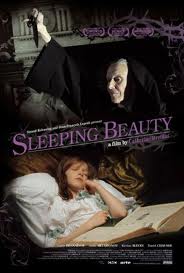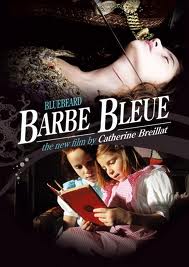Stepping Into the Story: Catherine Breillat’s Bluebeard and The Sleeping Beauty
February 3, 2012 § Leave a comment
Part Two: The Sleeping Beauty
 If French director Catherine Breillat’s Bluebeard explores the timeless tendency of young girls to identify with storybook characters to aid their burgeoning self-awareness, then The Sleeping Beauty, her next film in a trio of fairy tales (Beauty and the Beast will be Breillat’s third), shows how this same story-escapism can create a real identity-crisis shitstorm when it comes to the realm of romance, sex, and bruised expectations.
If French director Catherine Breillat’s Bluebeard explores the timeless tendency of young girls to identify with storybook characters to aid their burgeoning self-awareness, then The Sleeping Beauty, her next film in a trio of fairy tales (Beauty and the Beast will be Breillat’s third), shows how this same story-escapism can create a real identity-crisis shitstorm when it comes to the realm of romance, sex, and bruised expectations.
The Sleeping Beauty turns the visual spectacle dial up a notch from its Bluebeard setting—here we have sprightly sprites, a clan of clattering gypsies, and a be-gloved Jezebel of a Snow Queen, always shown in wavering blue light.
To the same degree, Breillat’s narrative structure gets even stranger. Narratively speaking, The Sleeping Beauty could be argued as less satisfying than Bluebeard, maybe because Breillat attempts some pretty awkward transitions by breaking the film into thirds. First comes the princess Anastasia’s birth and her “normal” childhood, in which she plays by herself, hates her dresses but loves her dictionary, and wants her parents to call her Vladimir. Then she pricks her finger at age 6 with a wooden hair implement, and we have her long dreaming state, in which she befriends another child named Peter and goes on a quest to rescue him from the evil Snow Queen, meeting an odd prince and princess and an eccentric gypsy girl along the way. Finally, in perhaps the most jarring move, Anastasia is suddenly awake, in the midst of puberty and contemporary France, and she has an affair with the moody teenage boy—Peter’s grandson, we’re meant to believe—who finds her alone in her family’s abandoned estate.
In Bluebeard, Breillat’s divergences from the original Perrault story were done on the sidelines: an added framing device and some illuminations of character, but no ballsy renderings of plot. In The Sleeping Beauty, however, she takes great liberty with the familiar fairy tale, starting with the character’s age. The Sleeping Beauty of the title is not the princess we might remember from the stories—for one, she is only six, and not sixteen, when she falls into her hundred years’ sleep. She dreams through puberty, and wakes up one hundred years later, aged ten years. When asked why this is, the fairy who cast the spell shrugs and says, “childhood lasts too long.”
Touche, fairy. « Read the rest of this entry »
Stepping Into the Story: Catherine Breillat’s Bluebeard and The Sleeping Beauty
January 20, 2012 § Leave a comment
Part One: Bluebeard
 Bizarre, enchanting, sparsely told yet thematically intense. Bluebeard and The Sleeping Beauty, parts one and two of a triptych of fairy tale films (Beauty and the Beast will be third) by director Catherine Breillat are, for my money, touchstones, criterions, truly exceptional examples of what a fairy tale adaptation can be.
Bizarre, enchanting, sparsely told yet thematically intense. Bluebeard and The Sleeping Beauty, parts one and two of a triptych of fairy tale films (Beauty and the Beast will be third) by director Catherine Breillat are, for my money, touchstones, criterions, truly exceptional examples of what a fairy tale adaptation can be.
In other words, they’re pretty boss.
As entertainment for a casual viewer, let me tell you, these two are flawed. Breillat doesn’t allow her films to be entirely self-explanatory, and believe me, I’ve had quite a time trying to parse out a concise thesis from the myriad impressions swimming through my brain. Even for the more discerning film viewer, there are flaws: Breillat espouses  some narrative devices that are just, to put it kindly, awkward as all-get-out, and thematic explorations that take at least two more viewings to get even a handle on. In this review, I’m not going to try and argue that these films are perfect—but that for a fairy tale lover (and you know what I mean—we’re not talking Disney here, ever), these are required viewing.
some narrative devices that are just, to put it kindly, awkward as all-get-out, and thematic explorations that take at least two more viewings to get even a handle on. In this review, I’m not going to try and argue that these films are perfect—but that for a fairy tale lover (and you know what I mean—we’re not talking Disney here, ever), these are required viewing.
Though I can see these two films working thematically in tandem, I’m going to start by talking about each separately, beginning with Bluebeard.
Bluebeard is deceptive.
Sleeping Beauty Has Always Been About Sex.
November 29, 2011 § 15 Comments
Before I begin with Breillat and Campion’s sexy new Sleeping Beauties (trailers below), Mr. Jack Zipes and how he sees into the insides of my brain, and the vast sweeping problem of internet trolls, let me admit fully: I can see what this blog has become. If I could tell wee little Cate of October to give her blog a name that more obviously advertised her overwhelming obsession with fairy tale retellings and her desire to sink her ineffectual teeth into the hides of those who would desecrate the names of Grimm, Andersen, and Pushkin, I would. But you can’t live in the past, dear readers, and that’s a fact. Oh, how long ago October seems, and already this blog has found a pretty clear focus.
Stick with me, readers. I’ve found a niche.
That said, let me give you a piece of worldly advice: never read comments on articles you like. You’ll want to. You’ll read an article that speaks to you, or just generally amuses you in a pleasant way, and you’ll see the “30 comments” button winking at you.
My goodness, you’ll say. How delightful! 30 people who surely feel the same exact way I do about what I just read and who couldn’t possibly have anything negative to say about it! Let’s meet them!
Don’t meet them. You’ll hate them. In all likelihood, if given the chance, they’ll hate you too.
We all know that there are, out there, your obvious “u suk!” internet trolls out there (and fellow blogger Amy at Lucy’s Football has a hilarious tutorial on how to be an effective one here), but possibly even worse–or just more irritating–are the ones who really want to show everyone how effing smart they are. Like, SMARTER THAN A COLUMBIA PHD smart. Smarter than SOMEONE WHO’S BEEN STUDYING THIS SHIT SINCE BEFORE YOU WERE BORN smart.
Case in point: this article, from August, on Salon.com, interviewing fairy tale expert Jack Zipes on the subject of the myriad of fairy tale film adaptations this coming year.
I know that Jack Zipes doesn’t know who I am and certainly doesn’t need me to defend him from the masses at Salon.com. So I hardly need to mention, to you readers or to the complete moron who sarcastically jabs at the interviewer calling Zipes an expert, this little achievement:
Jerkoffs. « Read the rest of this entry »